An increasing share of Americans – Republicans and Democrats alike – say there is solid evidence that the Earth’s average temperature has been getting warmer. But attitudes about global warming and the value of stricter environmental laws remain deeply divided along partisan lines.
In fact, the partisan divide about whether stricter environmental laws are worth the cost, or hurt the economy, is now about as wide as the differences over global warming. This marks a major shift from a decade ago, when majorities in both parties said stricter environmental laws were worth the cost.
Most Americans say it is important to do things to help the environment. But those with higher family incomes are more likely than less affluent adults to say they take steps to help the environment, even if it costs time or money.
Changing views on global warming
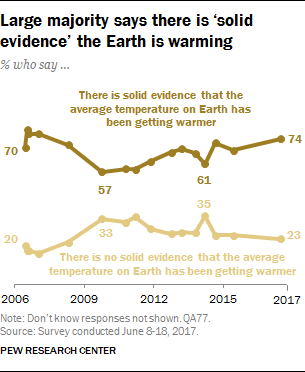
In the survey, conducted in June, 74% say there is solid evidence that the average temperature on Earth has been getting warmer, while 23% say there is no solid evidence that the Earth has been warming.
When asked a follow-up question about the causes of global warming, most people who see solid evidence of global warming – 53% of the public – say it is caused mostly by human activity such as burning fossil fuels, while fewer (18% of the public) say it is caused mostly by natural patterns in the Earth’s environment.
Overall, 10% of the public says there is no solid evidence of warming and thinks it is because climate change is “just not happening,” while a similar share (12% of the public) believes there is no solid evidence and says “we just don’t know enough yet about whether the Earth is getting warmer.”
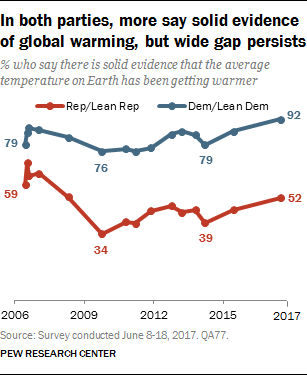
The share of Americans who say there is solid evidence of global warming – and that this has been caused mostly by human activity – has increased since 2014. At that time, 61% of the public said there was solid evidence of warming, and 40% of the public said the Earth was warming and attributed this mostly to human causes.
Since then, growing numbers of both Republicans and Democrats say there is solid evidence that the Earth’s temperature is increasing, but substantial differences persist.
About half of Republicans and Republican-leaning independents (52%) say there is solid evidence of rising global temperatures, up from 39% in 2014. Still, while the share of Republicans who say there is solid evidence of global warming has increased in recent years, it remains lower than a decade ago. By contrast, while clear majorities of Democrats have long said the Earth’s temperature is rising, the current share (92%) is as high as it has ever been in surveys since 2006.
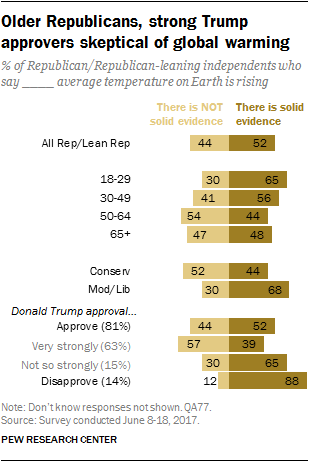
Unlike Democrats, Republicans are internally divided in views of global warming. Nearly two-thirds (65%) of Republicans and Republican leaners younger than 30 say there is solid evidence of global warming. Among those 50 and older, just 46% say this.
In addition, Republicans who strongly approve of Trump’s job performance (63% of Republicans and Republican leaners) are more likely than those who approve of him less strongly (or those who disapprove) to say there is no solid evidence of rising global temperatures.
Just 39% of Republicans who approve of Trump strongly say there is solid evidence that the Earth is warming, compared with majorities of those who approve of him not so strongly (65%) and those who disapprove (88%).
Few Republicans attribute rising global temperatures to human activity
While a growing share of Republicans say there is solid evidence of global warming, Republicans who express this view are divided about whether this is caused mostly by human activity. Only about a quarter of Republicans (24%) say there is solid evidence of rising global temperatures and that this is caused mostly by human activity; about as many (25%) say it is caused mostly by natural patterns in the environment.
Republicans who do not think there is solid evidence of global warming are divided in views of whether, in effect, this is a settled issue. Nearly identical shares of Republicans say global warming is “just not happening” (21%) and that not enough is yet known about this issue (22%).
An overwhelming share of Democrats (78%) say there is solid evidence the Earth’s average temperature has been rising and that this has been caused mostly by human activity. While 90% of liberal Democrats express this view, a somewhat smaller majority of conservative and moderate Democrats say the same (69%).
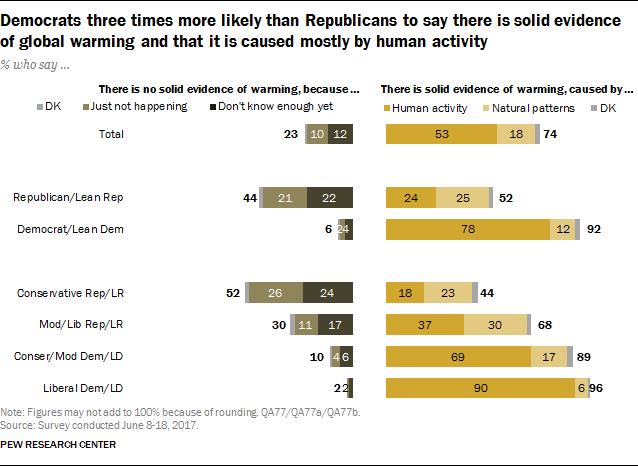
Among conservative Republicans, just 18% say there is solid evidence of global warming and that this has been caused mostly by human activity. About twice as many moderate and liberal Republicans express this view (37%).
Wider partisan gap in views of stricter environmental regulations
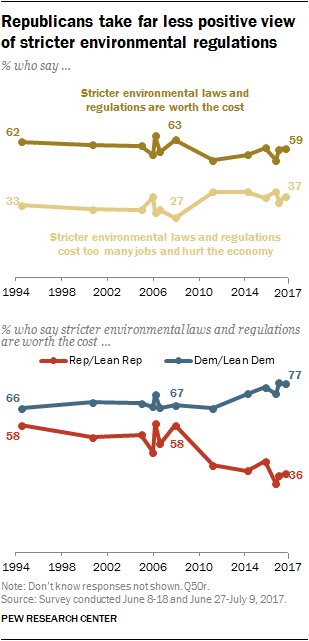
When it comes to environmental laws and regulations, fully 59% of the public believes they are worth the cost. Less than half of the public (37%) believes stricter environmental laws and regulations cost too many jobs and hurt the economy. While these attitudes have fluctuated modestly since 1994, the partisan divide has grown substantially.
This has largely been caused by changes among Republicans and Republican-leaning independents. A decade ago, 58% of Republicans said stricter environmental regulations were worth the cost; 34% said stricter environmental regulations cost too many jobs and hurt the economy.
Today, these opinions have reversed: Just 36% of Republicans say stricter environmental laws are worth the cost, while 58% say they cost too many jobs and hurt the economy.
Democrats’ views have been more stable over the past two decades, but the share of Democrats who say stricter environmental laws are worth the cost has increased by 10 percentage points since 2007 (from 67% to 77%).
Younger adults are more likely than older Americans to express positive views of tougher environmental regulations. Two-thirds (67%)
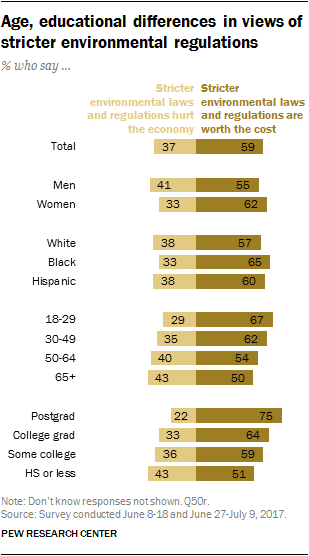
of those younger than 30 say such regulations are worth the cost, compared with 52% of those 50 and older.
People with higher levels of education are more likely than those with less education to say stricter environmental regulations are worth the cost. Three-quarters (75%) of those with a postgraduate degree say stricter environmental laws are worth the cost, compared with 64% of college graduates, 59% of those with some college experience and 51% of those with no college experience.
Views of importance of personal action to protect environment
Most Americans say it is important for them to take action to protect the environment, but some say they are not able to do this because they lack time or money. About half of the public (53%) says environmental protection is so important that they take action, even when it costs time or money; 37% say this is important, but they do not have the time or money to help the environment; and 9% say protecting the environment is not that important.
These attitudes vary by partisan ideology and family income. A majority of Democrats and Democratic leaners (63%) say taking action to protect the environment is personally important, even if it costs time or money. About four-in-ten Republicans (43%) say the same.
Those with higher family incomes are more likely than lower-income households to say that
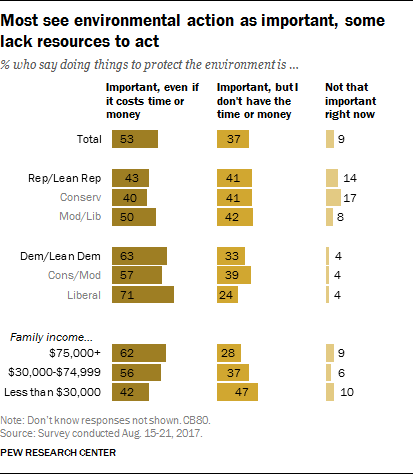
acting to protect the environment is important, even if it costs time or money. About six-in-ten (62%) of those earning $75,000 a year or more say it’s important to do things to protect the environment, even if it costs time or money. Among those earning less than $30,000 a year views are mixed: 47% say protecting the environment is important but they don’t have the time or money to help, while 42% say it’s important and they do things in their everyday life to help.
The view that it’s important to take action on the environment even if it costs time or money is particularly widely held among those with family incomes of $150,000 or more (74%), the highest income bracket measured in the survey.